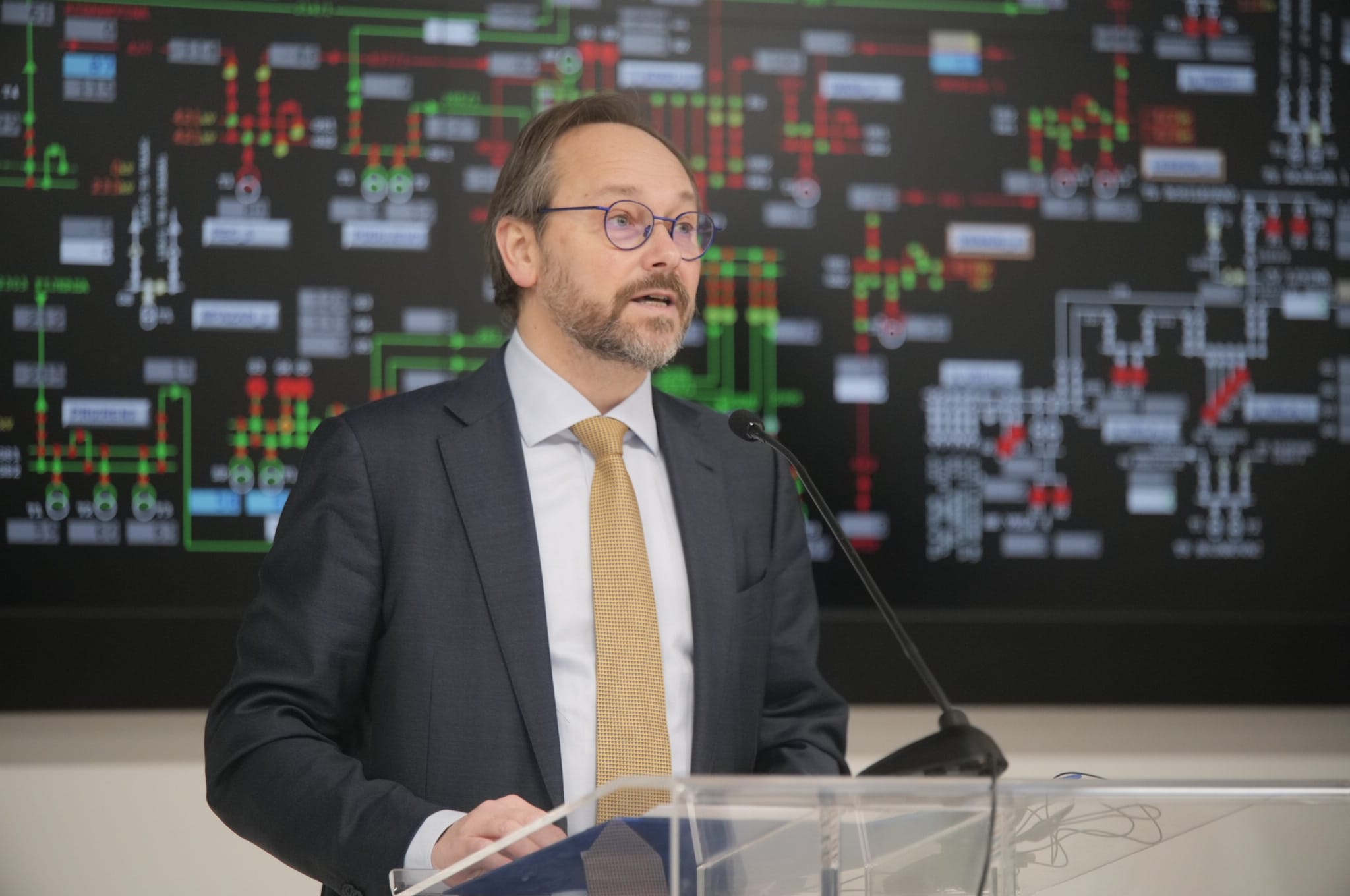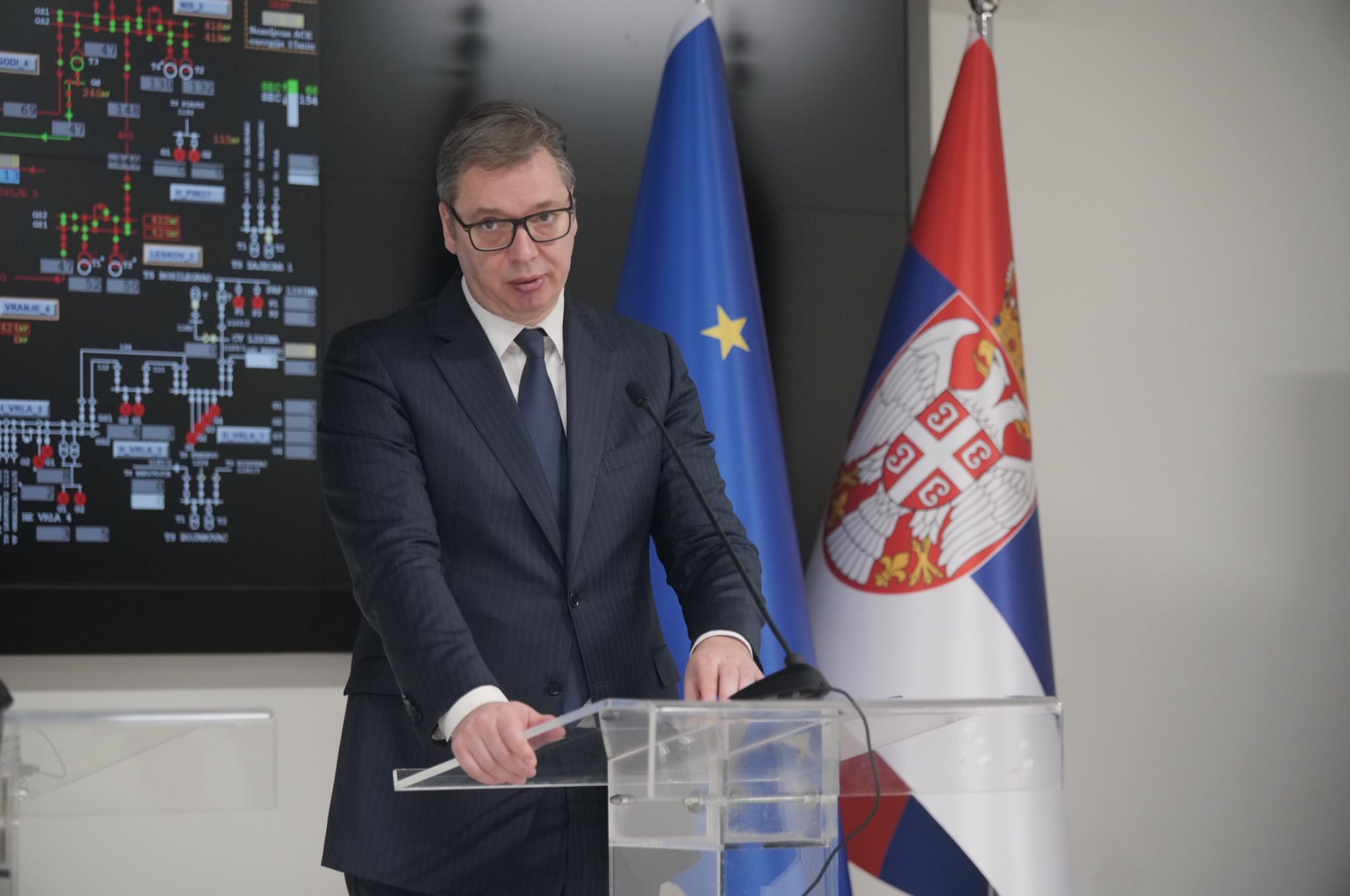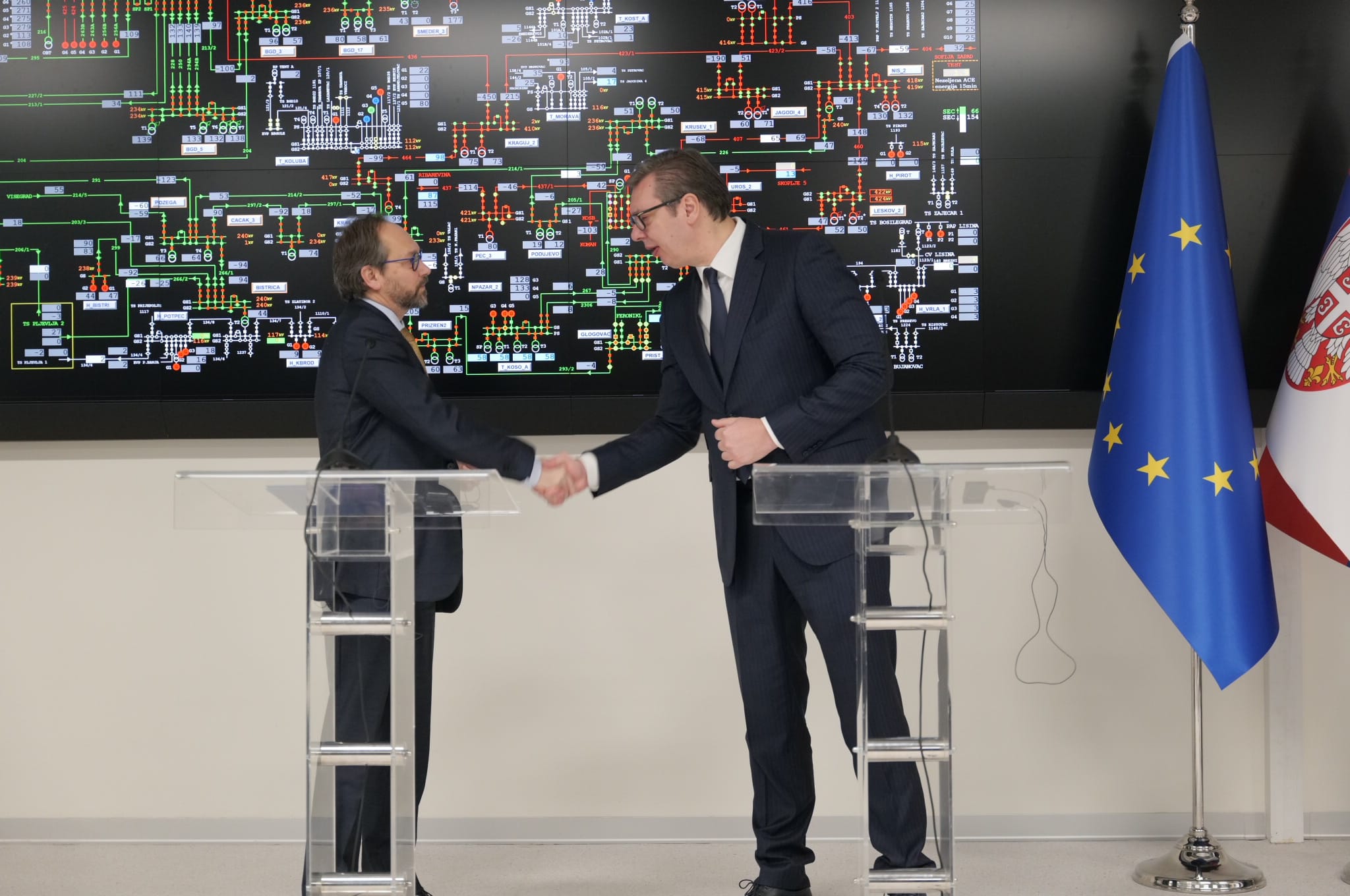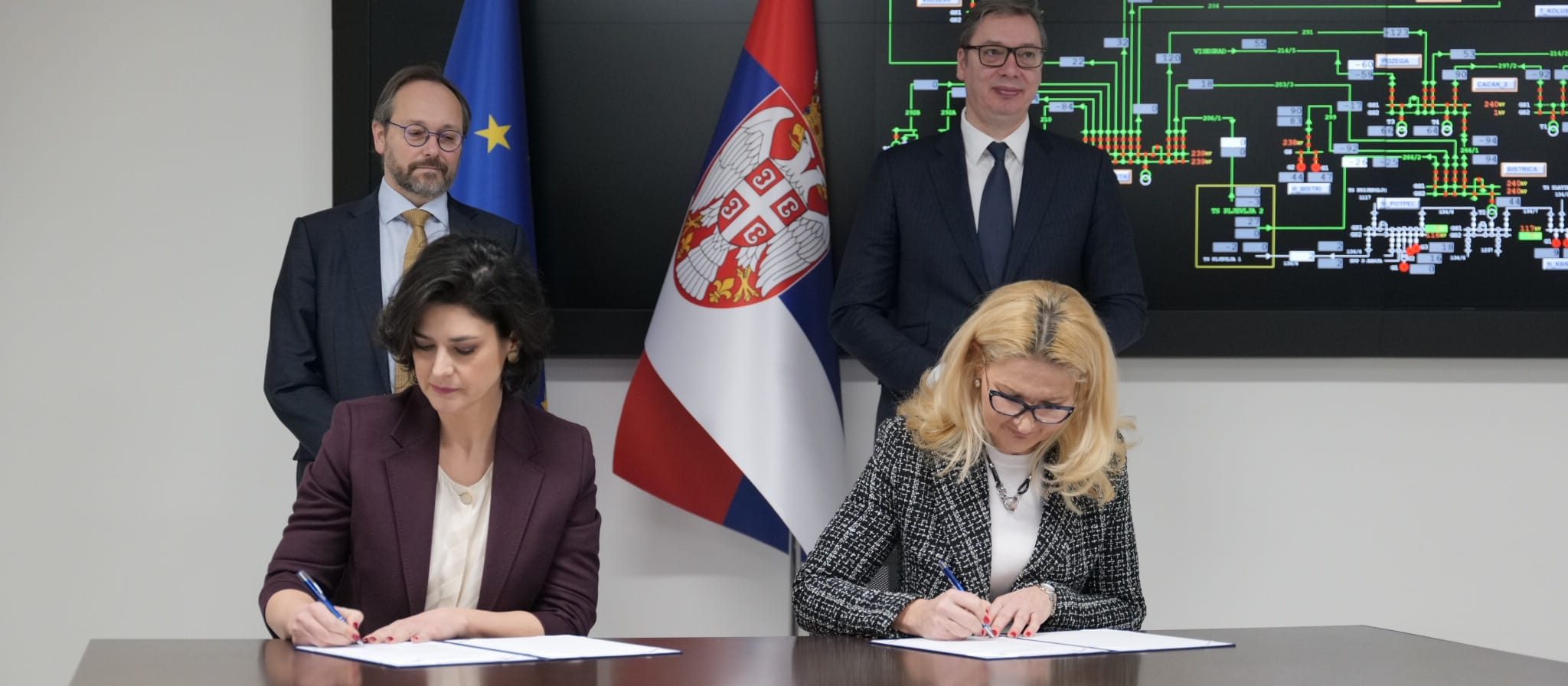Representatives of Serbia and the EU signed protocolarly today the financial agreement on the Energy Support Package of the European Union for Serbia worth 165 million Euro. The agreement was signed at the National Electric Network centre, in the presence of the President of Serbia, Aleksandra Vucic and the EU Ambassador to Serbia, Emanuele Giaufret, as well as the Minister of EU integrations, Tanja Miscevic, Minister of Energy, Dubravka Djedovic, Minister of Finance, Sinisa Mali and representatives of EU member states – Ambassadors of Sweden, Spain and Czech Republic.
The package will address both the immediate support, helping up to 191,000 vulnerable families and business to cope with the energy crisis, as well as more strategic support, helping Serbia’s energy security, diversity and transition towards green energy.

“President von der Leyen said when she visited Nis last October: “whatever the European Union does, the Western Balkans are included because we are so much interconnected. Today, we are achieving another landmark and illustration of this partnership during energy crisis, with the signature of this 165 million Euro donation as direct budget support to Serbia. This is meant to cater for the immediate needs of Serbia, and in particular for the most vulnerable families, who will be able to continue benefiting from reduced energy prices and keep their children warm in the winter, but also to Small and Medium sized companies – to help them cope with higher energy prices. This is very tangible. Thanks to this, during 2023 at least the same number of households as in 2022 will be protected (68.000), and this number will increase progressively to 191.000 by the end of the year,” said EU Ambassador to Serbia, Emanuele Giaufret and added that Serbia will in parallel also benefit under this tranche of EU funds in the form of a new wind farm in Kostolac and the reconstruction of the Vlasina hydropower plants, among other projects, as part of more long term goals towards green energy transition.
In his statement, the President of Serbia, Aleksandar Vucic, thanked the EU and its citizens for the support, which strengthens Serbia’s capacities.

‘’ This support will enable more vulnerable people to pay lower prices for electricity. In this division of labour in Europe, we will be able to save some of the small and medium-sized enterprises through the money we will invest in them in this way and in the lower price of electricity. This would not be possible at such level if it were not for the support of the EU. This is a great gift for us and I hope we will be able to say thank you for something that structurally and fundamentally strengthens the capacities of the Republic of Serbia.’’
‘’We must know what pushes Serbia forward, feeds our country, brings jobs to the youth, and what brings them the future. We often underestimate what the EU does for us’’, said Vucic, and thanked also the European Commission President, Ursula von der Leyen, for her visit to the gas inter-connector near Nis, in October last year.
The leaders of the European Union and the Western Balkans met on December 6, 2022 at the Summit in Tirana. A wide range of support measures and political activities were announced, including a new package of energy support for the Western Balkans with a total value of one billion euros. From the first EU budget support package of 500 million euros, Serbia will directly receive 165 million euros, which represents the largest share compared to other partners from the Western Balkans. The financial agreement that should be signed is a legally valid contract between the EU and the Republic of Serbia, which enables the transfer of 165 million euros to the Serbian budget. The money is made available for the implementation of the energy road map of the Government of Serbia, which describes what the EU money should be spent on.

On 6 December 2022 leaders of the European Union and the Western Balkans met in Tirana at the EU-Western Balkans summit. A wider range of support measures and policy actions were announced – one of them being the new Energy Support package for the Western Balkans worth altogether €1 billion. From the first 500 million Euro package of EU budget support, Serbia will receive directly 165 million Euros, the biggest share among the Western Balkans partners. The financial agreement about to be signed is the legally valid contract between the European Union and the Republic of Serbia through which the transfer of the 165 million Euros into the treasury of Serbia is being enabled. The money is being made available to implement the energy roadmap of the government of Serbia, which describes what the EU money is meant to be spent on.
Subsidies for vulnerable households to overcome the price increase of energy bills are an already existing mechanism in Serbia to which the EU further contributes as more people are affected by the energy crisis. The EU non-refundable grant will add to the Serbian budget to ensure that the most vulnerable families can continue benefitting from a lower energy price. Thanks to this, during 2023 at least the same number of households as in 2022 will be protected (68.000 households), and this number will increase progressively to 191.000 households, until 31 December 2023. In practice, the protected households with two members who now pays around 3770 dinars for the electricity bills, will pay 1.721,87 dinars less for the electricity bills or 50% less every month for district heating for instance. In order to benefit from this energy discount, citizens should apply to the local government of their residence, which render decisions based on the Decree on energy vulnerable customers.
The EU non-refundable grant will add to Serbian budget to ensure that the SMEs can continue benefitting from stabile energy price. Thanks to this, during 2023 at least the same number of SMEs as in 2022 (70.000 companies) will benefit from the EU support, and this number may be increased by November 2023.In practice, the protected SME will benefit from a price cap. Support to the budget is to maintain the electricity price cap regardless the fluctuations at the electricity market.
Incentives to electricity consumers from the household category to reduce electricity consumption until 31.03.2023 to keep avoiding power cuts are also the part of the road map. Increased competition in the gas and electricity markets is planned, as well as unbundling and certification of all gas and gas storage operators, opening of the gas market and third-party access to the existing infrastructure and conducting auctions for producers of electricity from renewable energy
Energy security is in focus and it envisages co-financing of projects, adopting investment plan in the power sector for the development and upgrading of the existing power infrastructure by Q2 2023, and an investment plan in oil and gas sector to develop and upgrade existing energy infrastructure that mitigates the energy crisis by Q2 2023. Promoting energy efficiency and renewable energy is import and integral road map part with subsidy scheme to households and multifamily residential buildings for the implementation of energy efficiency measures and subsidy for solar panels, heat pumps etc. for private houses, SMEs and public buildings
The European Union has been supporting Serbia in the field of energy since the year 2000 with over 835 million Euros. There is a number of flagship projects either already ongoing or foreseen to be started soon. The Trans-Balkan Electricity Corridor – a joint project of the German KfW, EU and the Government of Serbia – will connect Serbia with Italy and provide a new more stable and efficient network with greener energy resources. A new gas interconnector with Bulgaria will help diversify energy sources for Serbia and help to make it less dependent on Russian gas. The EU currently improves the energy efficiency of several hospitals in Belgrade, including the biggest VMA hospital. So far the EU provided grants for energy efficiency measures in 200 buildings in Serbia, from kindergartens and schools to other major hospitals and government buildings.




